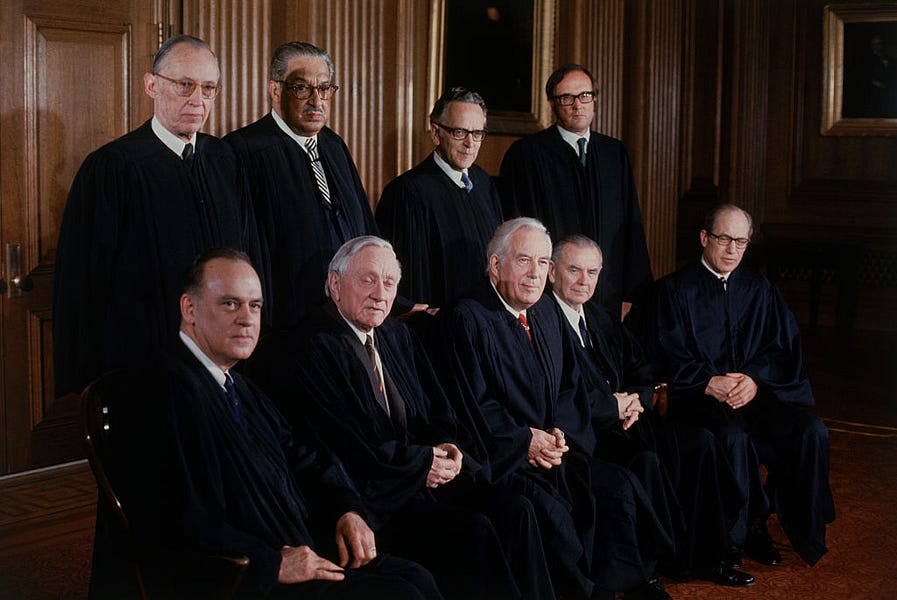When the Supreme Court handed down its decision in Roe v. Wade in 1973, the surviving 16 million men and women who had served in World War II had reached an average age of 56 years.
The president at the time, Richard Nixon, was just a bit older at 60, but he had been a Navy commander in the Pacific war, so a little seniority would be expected. Nixon and his fellow veterans had been in civilian life for more than 25 years, long enough to have mostly raised their families and to have reached the commanding positions of commercial, cultural, and public life.
Justice Harry Blackmun, who wrote the decision, and presiding Chief Justice Warren Burger were of a slightly older vintage. Burger was 34 when the Japanese bombed Pearl Harbor. He wanted to serve, but a bout with polio as a child disqualified him. He served at home on a war production board. Blackmun, Burger’s Minnesota childhood friend and best man at his wedding, was a year younger; but Blackmun had gone to Harvard undergrad and law school, not the hometown St. Paul College of Law like Burger. By the time the war came, Blackmun was operating in some pretty rarified air.
The other five justices who joined in the decision were: Potter Stewart, who was one day shy of his 58th birthday when the decision came out and had served on Navy oil tankers during the war; Lewis Powell, 65, who had served as an intelligence officer in Sicily and North Africa; William Brennan, 66, the leading liberal on the court, who made Army colonel serving as a legal officer stateside; Thurgood Marshall, 64, who had not served, but by the start of the war was already deeply engaged in the fight at home against legal segregation; and William Douglas, the last of the true New Deal progressives on the court, who was 74 and a stateside veteran of World War I.
I don’t care for the term “Greatest Generation,” because not only have we had many great generations as Americans, it is terminal. Lord hear our prayer that the greatest generations are still ahead. But you would have to say that these justices had experienced some of the greatest challenges life in the 20th century had to offer. From varied beginnings, varied levels of education, and varied experiences, they crafted a decision that, at the time, seemed like a reasonable compromise. Whatever was wrong legally with the Roe decision or however you regard it morally, it represented what they imagined was the consensus position on a subject that had been very little considered in the law in their lifetimes and almost not at all before them.
The men who made Roe, mostly appointed by Nixon and Dwight Eisenhower, were trying to settle the very unsettled period that of the previous decade. The social unrest, political assassinations, riots, and upheaval that had marked the previous decade threatened to tear the country apart. Roe was an effort to develop a new normal.
The other major political stories of the year were all about trying to bring chaos to a close. The most important developments of 1973, other than Roe, were Nixon’s mostly successful effort to wind down the Vietnam War through peace talks brought about by the U.S. bombing campaign against North Vietnam and the deepening miasma of the Watergate scandal. In the fall of that year, Nixon fired the entire leadership of the Justice Department in a quest to finally put the issue to rest. In another matter of housekeeping, Vice President Spiro Agnew was pushed out of office in an unrelated corruption probe.
After a very stormy season, Americans were looking for safe harbors. Nixon’s resignation the following year when his efforts to obstruct justice ultimately failed, was the capstone on a period of massive dislocation. The real end of the era came in September 1974 when then-President Gerlad Ford pardoned Nixon to put an end to the issue once and for all.
Roe was a pillar of the new consensus that was crafted by the generation that had won World War II. The expected era of sweetness and light that Americans had hoped would follow the defeat of fascism had not materialized. Instead, communists had challenged the new liberal world order and marginalized groups at home that had suffered under the old order broke through and demanded acknowledgement and rights that had been denied to them before. In the years that followed the tempest of 1968 and running through Roe, Watergate, and the U.S. retreat from Vietnam was the effort by the victors of the great conflict of the 20th century to create a lasting consensus that would serve their country. And to a great extent they did.
Five decades later, it falls to us, their children and grandchildren, to forge another consensus. Our time is similarly afflicted with upheaval, political violence, anger, and distrust. Our time is also marked by fundamental concerns about the viability of America’s constitutional order in a challenging, modern environment.
It will be up to us to craft a new consensus. We will fail in significant ways, just as our forefathers failed. But if we only succeed as much as they did in building something that can last two generations, then we would be able to call ourselves worthy of our inheritance.







Please note that we at The Dispatch hold ourselves, our work, and our commenters to a higher standard than other places on the internet. We welcome comments that foster genuine debate or discussion—including comments critical of us or our work—but responses that include ad hominem attacks on fellow Dispatch members or are intended to stoke fear and anger may be moderated.
With your membership, you only have the ability to comment on The Morning Dispatch articles. Consider upgrading to join the conversation everywhere.